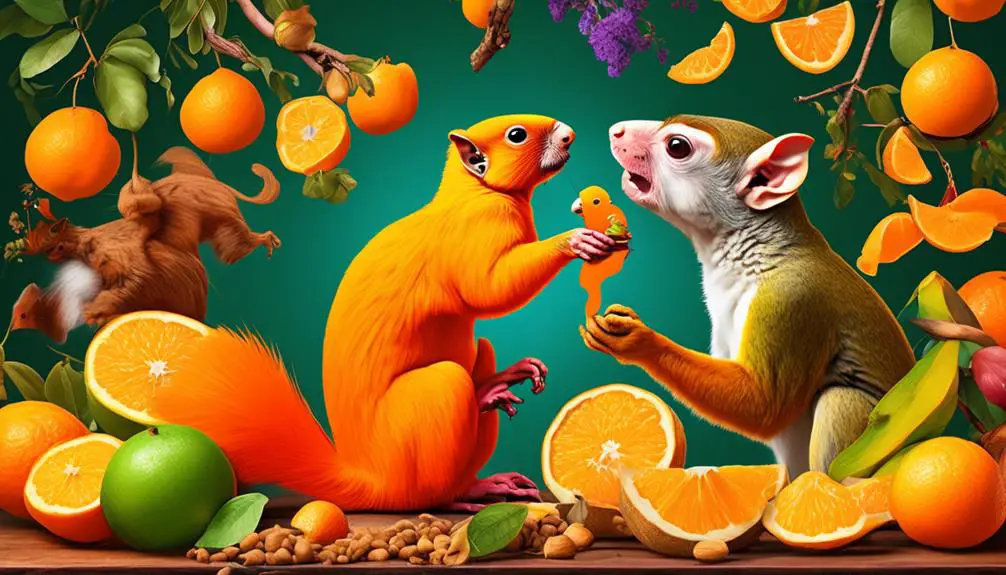Did you know that oranges are not only enjoyed by humans, but also by a variety of animals? It’s true! From turtles to monkeys, raccoons to squirrels, there are several creatures out there that have developed a taste for this tangy fruit.
But which animals specifically indulge in this juicy treat? And what precautions should be taken when feeding oranges to them? Stay tuned as we explore the intriguing world of animals and their love for oranges.
You won’t want to miss the surprising facts and helpful tips that await you!
Turtles and Fish
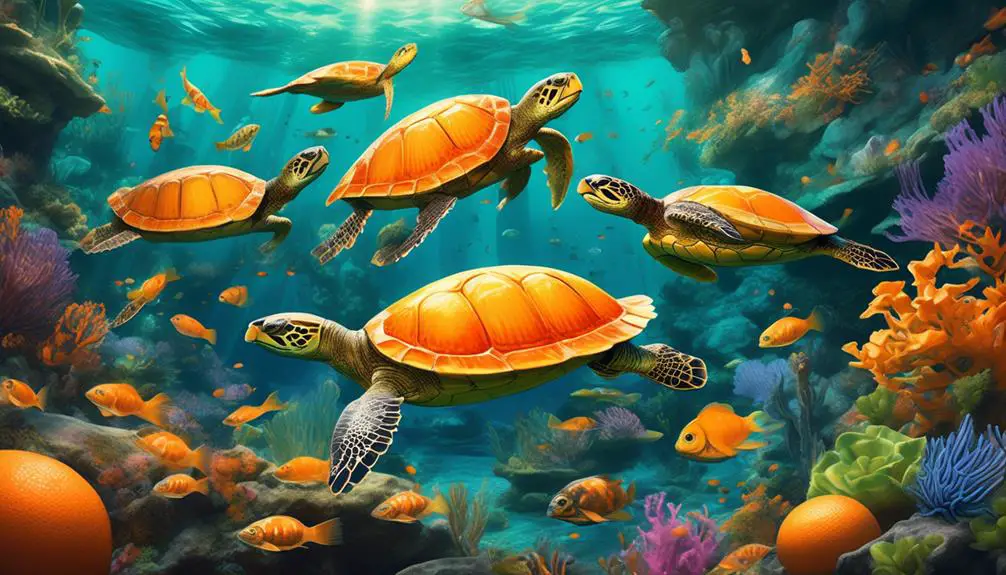
Turtles and fish, as part of their omnivorous diets, have the ability to consume oranges, although not all fish enjoy this fruit. Turtles, belonging to the order Testudines, are known to be omnivores and can eat both meat and fruit/vegetables. Fish, on the other hand, belong to the class Actinopterygii and can also eat oranges, but their preferences vary.
Oranges should be prepared before feeding them to turtles and fish. It’s important to cut the oranges into small pieces and peel them, as turtles don’t like the orange peel. Feeding turtles more than a few slices of orange should be avoided. Additionally, both turtles and fish shouldn’t consume any pips from the orange, as they can be harmful to their digestive systems.
Feeding fish oranges can be a form of enrichment for them, providing them with variety in their diet. So, while turtles and fish have the ability to consume oranges, it’s essential to consider their preferences and dietary needs when offering them this fruit.
Monkeys
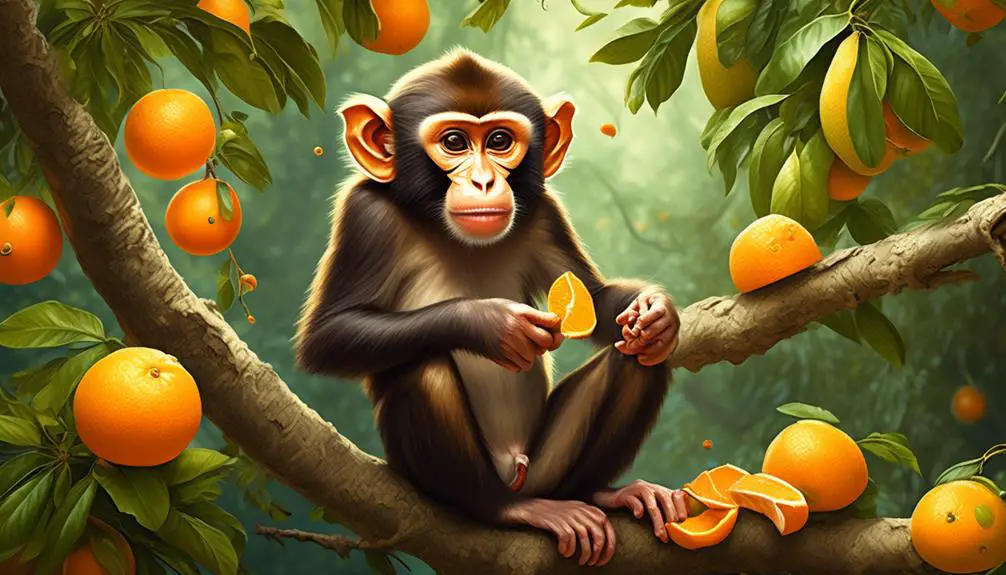
Monkeys, which belong to the order Simiiformes, have a natural diet that includes oranges. In the wild, monkeys in Asia and some species in South America consume oranges as part of their regular diet.
While monkeys in zoos aren’t commonly fed oranges, they’d likely enjoy them if given the opportunity. Feeding them oranges can provide potential benefits as a form of enrichment.
Natural Diet of Monkeys
Monkeys, being part of the order Simiiformes, have a natural diet that includes oranges as a regular component. Most monkeys, including those in Asia and some species in South America, naturally eat oranges as part of their diet in the wild. While monkeys in zoos are rarely fed oranges, they would likely enjoy them if given the opportunity.
| Monkeys’ Natural Diet |
|---|
| Fruits |
| Vegetables |
| Nuts |
| Insects |
Monkeys are omnivorous, meaning they consume both plant-based and animal-based foods. Their diet consists of a variety of fruits, vegetables, nuts, and insects. Oranges provide a good source of vitamin C and other essential nutrients for monkeys. In the wild, monkeys often forage for their food, including oranges, as they swing through trees and explore their surroundings. Including oranges in their diet helps to ensure they receive a balanced nutritional intake. So, if you ever encounter monkeys in their natural habitat, don’t be surprised to see them enjoying a juicy orange.
Feeding Oranges to Monkeys
Are oranges a suitable food for monkeys in captivity?
Monkeys, belonging to the order Simiiformes, naturally consume oranges as part of their diet in the wild. However, in zoos, monkeys are rarely fed oranges. Nevertheless, if given the opportunity, they’d likely enjoy this citrus fruit.
Oranges can provide monkeys with essential nutrients such as vitamin C, fiber, and potassium. It’s important to note that oranges should be peeled and cut into small, manageable pieces before feeding them to monkeys. This ensures easy consumption and minimizes the risk of choking.
Additionally, it’s crucial to avoid feeding monkeys the pips of the orange, as they can be harmful. While oranges can be a suitable addition to a monkey’s diet, it’s always recommended to consult with a veterinarian before introducing new foods.
Potential Benefits for Monkeys
Oranges offer potential benefits for monkeys in captivity, providing essential nutrients such as vitamin C, fiber, and potassium. These nutrients are crucial for maintaining the overall health and well-being of monkeys.
| Nutrient | Function |
|---|---|
| Vitamin C | Supports immune system, aids in collagen production |
| Fiber | Promotes healthy digestion, prevents constipation |
| Potassium | Regulates fluid balance, supports heart and muscle health |
In addition to these nutrients, oranges also contain antioxidants that help protect cells from damage caused by harmful free radicals. Feeding oranges to monkeys can be a valuable form of enrichment, as it provides a novel and stimulating food source. However, it is important to note that oranges should be offered in moderation, as excessive intake can lead to digestive issues. Consulting with a veterinarian is recommended to determine the appropriate amount of oranges to include in a monkey’s diet.
Raccoons
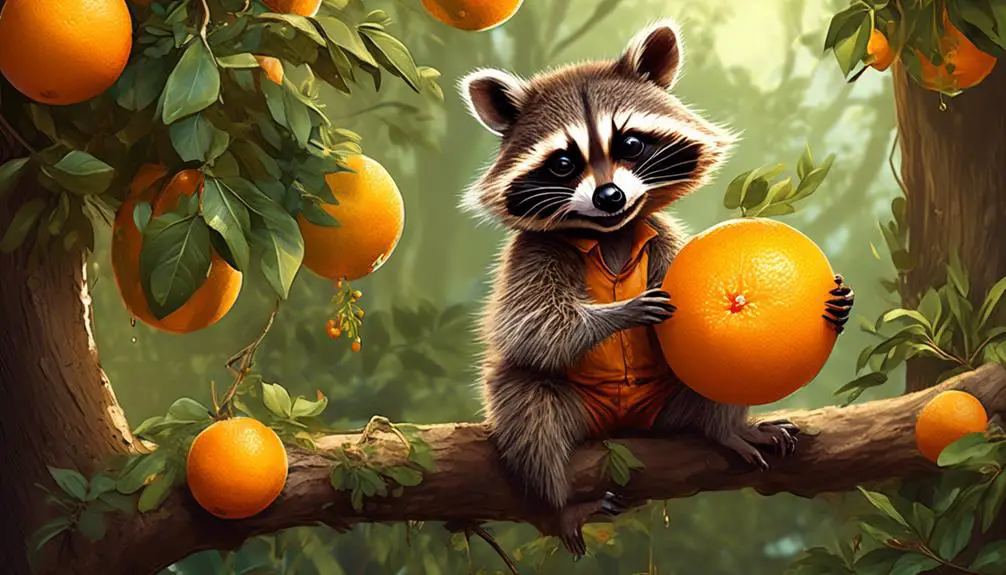
Raccoons, scientifically known as Procyon lotor, have a varied diet and are opportunistic eaters. They’re known to consume a variety of foods, including oranges. Interestingly, raccoons will even peel oranges before eating them, showing a level of dexterity and adaptability.
This behavior can have an impact on orange trees, as having raccoons in the area may result in less fruit due to their consumption.
Raccoon Diet Preferences
Raccoons have a diverse diet and are known to consume a variety of foods, including oranges. These clever creatures, scientifically known as Procyon lotor, are opportunistic eaters and won’t hesitate to indulge in a juicy orange.
Raccoons have a keen sense of smell and can detect the scent of ripe fruit from a distance. They’re even known to peel oranges before consuming them, showcasing their dexterity and adaptability.
If you have an orange tree in your area, be prepared for raccoons to feast on your fruit, as they’re notorious for raiding trash cans in search of food, including oranges. With their ability to adapt to different environments and their willingness to explore various food sources, raccoons truly exemplify the concept of opportunistic eating.
Orange Peeling Behavior
The peeling behavior exhibited by raccoons when consuming oranges showcases their dexterity and adaptability. Raccoons, scientifically known as Procyon lotor, are opportunistic eaters and will consume a variety of foods, including oranges. Their nimble paws allow them to grasp the orange firmly while using their sharp claws to puncture the thick peel. With precise movements, they skillfully peel away the outer layer, revealing the juicy flesh inside.
This behavior demonstrates their ability to adapt to different food sources and manipulate objects with their agile hands. Raccoons’ peeling behavior also serves a practical purpose, as it allows them to access the nutritious pulp of the orange. Their resourcefulness in obtaining food highlights their survival skills and ability to thrive in various environments.
Impact on Orange Trees
The consumption of oranges by raccoons can have a significant impact on orange trees in the area. Raccoons, scientifically known as Procyon lotor, are opportunistic eaters and are known to peel oranges before consuming them. If there are raccoons present, having an orange tree may result in decreased fruit yield due to their consumption.
These nocturnal creatures are notorious for rummaging through trash cans in search of food, including oranges. Their foraging behavior can lead to damage to the tree and its fruit. Raccoons’ strong jaws and sharp teeth may cause punctures in the oranges, making them susceptible to rot and fungal infections. Additionally, raccoons may disturb the soil around the base of the tree, potentially damaging the root system.
Therefore, it’s important to implement deterrents or protective measures to minimize the impact of raccoons on orange trees.
Squirrels
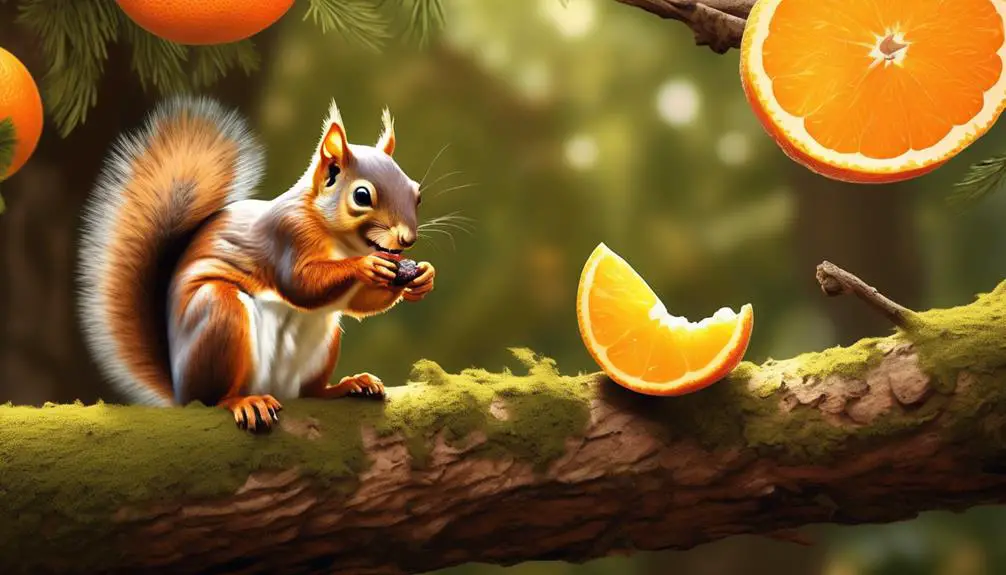
Squirrels, members of the family Sciuridae, are known to have a primarily nut-based diet but can also consume oranges if they’re readily available. While nuts make up the bulk of their diet, squirrels are opportunistic eaters and will readily consume a variety of foods. Oranges can be a source of nutrition for squirrels, providing them with essential vitamins and minerals.
When offering oranges to squirrels, it’s important to peel and cut them into small pieces for easy consumption. Squirrels, like other animals, may struggle to consume a whole orange due to its size and tough peel. By providing them with peeled and cut oranges, you can ensure that they can enjoy this fruit without any difficulty.
Additionally, offering oranges as a food source can be a form of enrichment for squirrels, providing them with a change in taste and texture. So, if you have oranges available and notice squirrels in your area, consider offering them this nutritious fruit as a treat.
Other Potential Orange Eaters
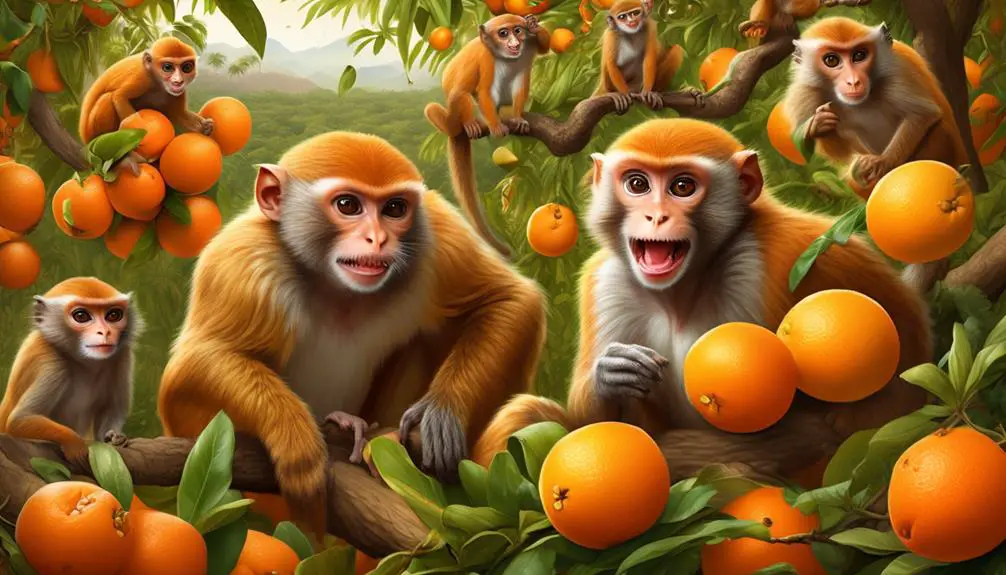
If you’re interested in learning about other animals that may consume oranges, there are several potential orange eaters to consider. One such group includes turtles and fish. Turtles, belonging to the order Testudines, are omnivores and can eat both meat and fruit/vegetables. Fish, on the other hand, are part of the class Actinopterygii and can also consume oranges, although not all of them may enjoy it. When feeding oranges to turtles and fish, it’s important to cut them into small pieces and peel them beforehand. Turtles, in particular, don’t like orange peel and it should be removed before feeding them. Additionally, it’s crucial not to feed turtles more than a few slices of orange and they shouldn’t eat any pips from the fruit. Feeding fish oranges can be a form of enrichment for them.
Another group of animals that may consume oranges is monkeys. Monkeys, belonging to the order Simiiformes, naturally eat oranges as part of their diet in the wild. While monkeys in zoos are rarely fed oranges, they’d likely enjoy them if given the opportunity.
Raccoons, scientifically known as Procyon lotor, are opportunistic eaters and will consume a variety of foods, including oranges. In fact, raccoons are known to peel oranges before eating them. If there are raccoons in the area, having an orange tree may result in less fruit due to their consumption. These clever creatures are also notorious for digging through trash cans in search of food, including oranges.
Lastly, squirrels, belonging to the family Sciuridae, primarily consume nuts but will also eat oranges if they’re readily available. Similar to raccoons, squirrels are opportunistic eaters and have a wide range of food preferences. When offering oranges to squirrels, it’s advisable to peel and cut them into small pieces for easy consumption.
Tips for Feeding Oranges to Animals
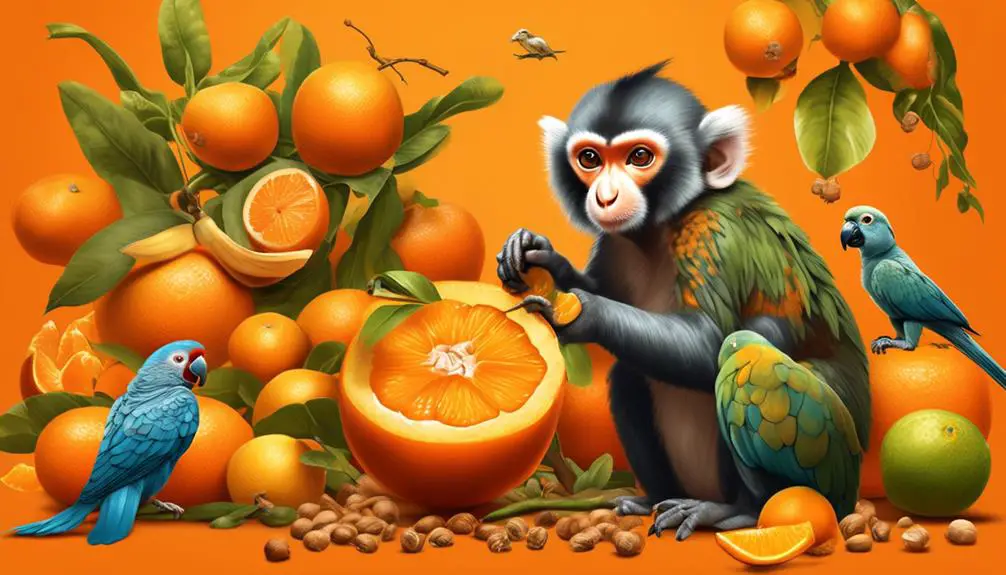
To ensure the proper feeding of oranges to animals, it’s important to follow these tips.
When feeding oranges to turtles and fish, it’s crucial to cut the fruit into small pieces and peel it before offering it to them. Turtles, being omnivores, can eat both meat and fruit/vegetables, including oranges. However, they don’t enjoy the orange peel, so it should be removed before feeding them. It’s recommended not to feed turtles more than a few slices of orange and to ensure that they don’t consume any pips.
Fish, on the other hand, can also eat oranges, but not all of them enjoy it. Feeding oranges to fish can serve as a form of enrichment for them.
Moving on to monkeys, most species naturally eat oranges as part of their diet in the wild. While monkeys in zoos are rarely fed oranges, they’d likely enjoy them if given the opportunity.
Raccoons, being opportunistic eaters, will eat a variety of foods, including oranges. They’re even known to peel oranges before consuming them.
Finally, squirrels, primarily nut eaters, will also consume oranges if readily available. Oranges should be peeled and cut into small pieces for squirrels to easily consume. It’s important to note that both raccoons and squirrels are opportunistic eaters and will consume a wide range of foods.

Erzsebet Frey (Eli Frey) is an ecologist and online entrepreneur with a Master of Science in Ecology from the University of Belgrade. Originally from Serbia, she has lived in Sri Lanka since 2017. Eli has worked internationally in countries like Oman, Brazil, Germany, and Sri Lanka. In 2018, she expanded into SEO and blogging, completing courses from UC Davis and Edinburgh. Eli has founded multiple websites focused on biology, ecology, environmental science, sustainable and simple living, and outdoor activities. She enjoys creating nature and simple living videos on YouTube and participates in speleology, diving, and hiking.

